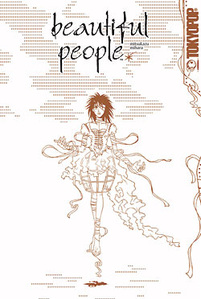Review
by Mikhail Koulikov,Beautiful People
G.novel 1
| Synopsis: |  |
||
Mizuhara Mizuho presents six short stories united by the common theme of loneliness in a demanding and impersonal modern world, and the ways different Japanese people, from a teenager whose only friend is the person he talks to online, to a single professional who feels ignored by her co-workers, try to cope with their daily realities and find acceptance for what they are. |
|||
| Review: | |||
One clear benefit of Tokyopop's success over the last couple of years has been their willingness to experiment with the kinds of titles the company licenses. At the most basic level, this can be seen in things like their hard-cover editions of Shirahime-Syo and Doll, but more important is the increase in the range of stories Tokyopop makes available. Whereas most of the manga released in the US are still sprawling multi-volume epics, for every Fruits Basket or Kare Kano, something like Beautiful People comes along. The first thing to be said about this relatively slim (only about 150 pages) volume is that its understated cover, with the drawing of a mysterious girl in bandages and tattered clothes, does a great job of catching your eye. And once you've looked through the first couple of pages, the story and Mihara's unique, recognizable art style take over and do the rest. According to the description on the back, Beautiful People “ruminates on the power that love and loss has on our collective consciousness” - this already sets the bar quite high, and shows that whatever this book turns out to be, it's not going to be your usual story of high adventure in a vaguely medieval setting or, for that matter, yet another harem comedy. Of the six stories in the volume, three fall firmly into the genre of urban fantasy in the Charles de Lint vein, although the first, Princess White Snow, begins with essentially the same setup that opens CLAMP's Chobits. A young man, recently moved to the Big City, stumbles across an unconsious girl in a back alley, and brings her back to his apartment. But whereas Chobits took that setup and played it for comedy, Mihara's approach is essentially realist; the boy's existence is composed primarily of overdue bills, dead-end jobs, and meaningless sex, and the appearance of another person in his life, no matter how otherworldly, will not really change anything. Blue Sky is a touching take on a ridiculous-sounding proposition: what happens when a vampire wandering the same kind of Big City meets a little girl who has lost (...or was abandoned by) her mother? In all of twenty-three pages, and just a few dozen sentences, Mihara sketches their life together over the course of fifty years. And in Beautiful People, the story that lends its title to the entire collection, a woman who has undergone extensive plastic surgery but still does not feel she is “beautiful enough” goes back to the small town she grew up in and befriends a girl who is literally stitched together from body parts. The fourth story in the collection is, whether intentionally or not, basically an update of the classic Twilight Zone episode ”Time Enough at Last”; two teens hide in a wine cellar only to come out and find that they are the only ones left alive in a world devastated by a biological weapon. They could be the new Adam and Eve...except This is Japan in 2001, not Eisenhower-era America, and before going about repopulating the Earth, they need to deal with the fact that both are homosexual. But ultimately, it is the middle two stories of the six, Electric Angel and The Lady Stalker that are by far the strongest. In the first, a teenager who has to deal with ridicule at school and an alcoholic and abusive father at home finds the only kind of acceptance he can from an online chat partner who, somehow, is strangely familiar. The second is a candid look at the relationships, politics, and neuroses within an average Japanese office. Both are about as far as you can come from the usual subject matter of most manga. They are sober, somber, melancholy and revealing, presenting the kind of flip side of Japanese society that manga almost always stays away from. As in Doll, Mihara's other work that Tokyopop has published so far, one of the features of Beautiful People that is immediately evident is the amount of attention she pays to characters' clothes - especially those that are in the EGL style. In general, the art pays a lot more attention to faces than it does to backgrounds. For its part, the page layout, with each separate image constricted to a single panel, and frequent use of word balloons and plain text in otherwise empty panels to show characters' thoughts, is almost more reminiscent of American graphic novels than of manga. Beautiful People is not “entertaining”in the comedy sense, and reading it will leave you feeling uneasy, especially if your familiarity with Japanese culture is based entirely on manga and anime. What it is is, on the other hand, is one of the finest examples of literary manga currently available in English, and beyond that, a title that I would very strongly recommend to anyone who is interested in graphic novels in general beyond the standard superhero/action line-ups |
| Grade: | |||
|
Story : A-
Art : A-
+ An excellent look at the flip side of Japanese society, its fears, worries, and the difficulties Japanese people of all walks of life face in their daily lives. ⚠ Attempted rape, strong sexual content |
|||
| discuss this in the forum (5 posts) | | |||
| Production Info: | ||
|
Full encyclopedia details about Release information about |
||